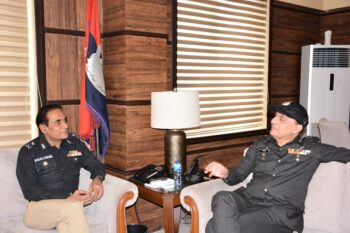KARACHI: In a significant stride towards eradicating smuggling activities, the Customs Enforcement in Karachi has been tirelessly working around the clock. The recent operations led by Basit Maqsood Abbasi, the Collector of Customs Enforcement Karachi, have resulted in a substantial seizure of smuggled goods.
Acting on confidential intelligence, the Anti-Smuggling Squad (ASO) of the Enforcement Collectorate Karachi, spearheaded by Deputy Collector Muhammad Raza Naqvi and in collaboration with SSP City Sindh Police Arif Aziz, executed a successful joint operation in the Kharadar area of Karachi. The operation culminated in the confiscation of smuggled ladies’ fabric worth an estimated Rs40 million. A case has been registered, and investigations are currently underway to unravel the network behind this illicit trade.
In a parallel effort, the Anti-Narcotics Force (ANF) has intensified its crackdown on drug smuggling. Through a series of seven targeted operations, the ANF has recovered a staggering 391.6 kilograms of narcotics and apprehended 18 suspects. Notable among these operations were two conducted near the Lakpass toll plaza in Mastung, which resulted in the recovery of 195.6 kilograms of hashish from four individuals. Similarly, operations at the Sangjani toll plaza in Islamabad yielded 57.6 kilograms of opium and 70.8 kilograms of hashish, with five suspects taken into custody, including one female.
Further successes were recorded in Hyderabad with the recovery of 34 kilograms of hashish, in G-15 Islamabad with 18 kilograms of hashish, and in Haripur where 15.6 kilograms of hashish were seized from three suspects. All arrested individuals are now facing charges under the Anti-Narcotics Act, and thorough investigations have been initiated.
The ANF’s rigorous inspection of consignments has led to a call from customs officials and importers for more transparency. They urge that container examinations should occur in their presence to ensure due process and accountability. While the ANF’s mandate is to intercept narcotics, the broader responsibilities of customs regulation fall under the purview of the Customs department.
The anti-smuggling campaign has garnered support from Military Intelligence (MI) and the Intelligence Bureau (IB), providing crucial intelligence to aid Customs operations. MI is at the forefront of this campaign, ensuring coordination among various law enforcement agencies including the Police, levies, Frontier Corps, coast guards, ANF, and Maritime Security Agencies.
A special desk has been established at the General Headquarters (GHQ), with direct reporting to the Chief of Army Staff General Asim Munir. The campaign is gaining momentum across the country, with a prime focus on Baluchistan, Karachi, and KPK.
In a recent development, Chief Collector Baluchistan Yaqoob Mako convened with Baluchistan Police Chief Abdul Khalique Shaikh, leading to a joint operation that resulted in the seizure of eight luxury non-custom paid (NCP) vehicles in a single day.
Customs has adopted a zero-tolerance policy towards smuggling, with no external influences swaying their operations. High-profile officers such as Chief Collector Yaqoob Mako, Collector Enforcement Quetta Tahir Qureshi, and Collector Appraisement Yaseen Murtaza have been appointed in Baluchistan to reinforce this stance. FIRs are being lodged for cases exceeding Rs5 million in value, instilling fear among smuggling rings. Daily operations are being conducted in Karachi, Quetta, and other regions, targeting not only the transportation of smuggled goods but also warehouses and markets.
The crackdown has also impacted the flow of ‘hush money’ that previously lined the pockets of officials and funded agency operations. With this source of unofficial funding drying up, there are calls for proper incentives and rewards for personnel to curb corruption.
The involvement of sensitive agencies in the anti-smuggling campaign has been questioned, particularly in light of geopolitical developments. The Chabahar port and Bandar Abbas in Iran, now under Indian control with a significant military presence, have become focal points of concern. During a visit by Iranian President Raise to Pakistan, the Pakistani government expressed its disapproval of the Indian military presence in Iran, which is believed to be exacerbating issues in Baluchistan. Consequently, an additional deployment of 10,000 troops was barred from entering Iran.
Intelligence reports suggest that Baluchistan separatists are receiving support from India via Iran, with smuggling being a key conduit for funding these elements. The situation underscores the complex interplay of regional politics and the imperative need for effective anti-smuggling measures.
This comprehensive campaign against smuggling is a testament to the dedication of Pakistan’s law enforcement agencies and their unwavering commitment to safeguarding the nation’s economic and security interests.
